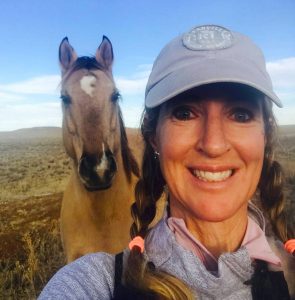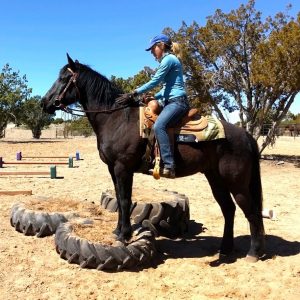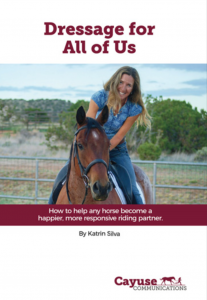
Katrin and friend
Editor’s Note: Best Horse Practices Summit presenter Katrin Silva grew up riding dressage in Germany before moving to the United States at age 19 to learn to ride Western. She’s been riding both disciplines for the last 20 years and is a regular guest columnist for Cayuse Communications. The author of Dressage for All of Us: How to Help Any Horse Become a Happier, More Responsive Riding Partner and the forthcoming Ride with Feel: A Guide for the Rest of Us lives in New Mexico where she works with dressage and Western clients.
Katrin Silva writes:
English is not my first language. It’s not my second language, either. It’s my third.
I grew up in Germany, where I learned to speak German without thinking about it, the way any child does. In high school, I learned English (and Latin, which does not really count, and French, which I never used). My teachers explained the rules of English grammar, correcting mistakes in red ink, assigning grades. I grew up in the 80’s and listened to a lot of Bruce Springsteen and the Dire Straits. And I realized that my English classes did not help me understand the lyrics.
In 1989, the day after I graduated from high school, I moved to Italy, without speaking a word of Italian. I found a job on a horse farm, where I cleaned stalls and rode horses no one else wanted to ride. I had no time to go to school, but learned to speak Italian just by hearing it all around me, every day, needing to speak it to survive.
I remember the kindness of my co-workers, their encouragement, the extra time they took to help me understand, their efforts to not laugh at my pronunciation. I never once heard anyone criticize my grammar. Whenever anyone corrected me, it was done with a smile. No one ever told me “You are saying it all wrong!” Six months later, I spoke relatively fluent Italian. And decades later, I still have a grasp of the language. It comes back to me whenever I hear or read it.
The following year, I moved to New Mexico with nothing but the big dream of becoming a professional cowgirl. I went to work for a Quarter Horse trainer, cleaning stalls and starting colts. I thought that my English was pretty decent, but I soon realized how wrong I was. Knowing the grammar wasn’t particularly helpful. My pronunciation was terrible. I stumbled over every “th” sound and all the drawn-out vowels. I had to think so hard about the correct word order that I avoided speaking in complete sentences. But over time – decades, really – my English improved. Today, I feel more comfortable speaking English than speaking German.

Katrin Silva at work in New Mexico
What does all this have to do with horses? Plenty. Learning to ride means learning to communicate with someone who speaks a very different language. It involves both learning their language and teaching them ours. It means understanding what our horses are telling us, and, using that feedback, teaching the horse what our aids mean.
- Knowing the grammar – the underlying system of these aids – is important. While we have to play by the rules, we can’t expect our horses to know them.
- Before we try to teach them our language, we need to to listen to what they have to say. We need to take in what they are saying, without pressure or expectation, like I did when I came to Italy.
- We need to offer our horses room to experiment, where they are not afraid to make mistakes. When we do correct a mistake, we can’t get stuck in saying “This is wrong!” Instead, we need to get to a place where we say “Yes, this is right!” as quickly as possible.
- The feedback we offer needs to be kind, constructive, and without judgment. A horse who worries about making a mistake can’t learn.
I remember feeling completely lost, in learning both English and Italian. I remember the waves of unfamiliar words and sounds crashing against me. I also remember the joy of wading in and learning to swim in that ocean, just like I remember the joy of learning to speak the language of the horse’s back with my back.
If you’ve never learned a new language, give it a try. You will come away with a better sense of what our horses need from us. We can make the ocean inviting for them. We can keep the waves small and the water warm. We owe them that much.

Remember the language of laughter as well, it always helps!
Thank you for the reminder!